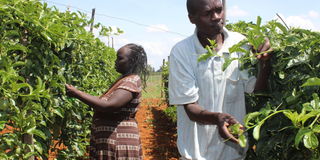Couple turns to passion fruit farming to boost their income

What you need to know:
- Initially, they planted maize for three years but had to wait for a year to get Sh50,000 from about 20 bags.
- Last year in July, the couple relocated to the 0.2 acres farm and started growing the passion fruits.
- They planted 400 plants but about 20 withered.
- In the second year, they uproot the crop and plant maize to control soil diseases.
While most people are staying at home due to the disruption of day-to-day activities by the Covid-19 pandemic, one couple in Uasin Gishu County is making the best out of it.
When schools closed early this year, Edwin Kiprop and Martha Ayabei, both of whom are teachers, have been busy making an extra coin from their farm.
The couple ventured into passion farming in 2015 after realising poor returns from the maize crop on their farm.
Initially, they planted maize for three years but had to wait for a year to get Sh50,000 from about 20 bags of the crop.
“The market for maize crop was also flooded with brokers. We realised that other farmers growing passion fruit in the area were earning more and that is how we decided to try our hands in the farming,” recalls Ms Ayabei.
ABANDONED VENTURE
She explained that they later abandoned the project after the worker they hired failed to take care after crop.
They planted 700 plants on 0.4 acres and at that time. The farm gate price for a kilo of the produce was between Sh100 and Sh120.
Ms Ayabei says their crop was affected by the passion fruit woodiness virus.
“Since we were not there, we did not know how to address the problem. We did not plant since then because most farmers in the area were affected due to the disease,” she explains.
Last year in July, the couple relocated to the 0.2 acres farm and started growing the passion fruits. They planted 400 plants but about 20 withered.
On average, the couple harvests 200 kilogrammes in a week with a kilo going for between Sh40 and Sh60. In April, the prices shot up to Sh70 during Ramadhan.

Ms Martha Ayabei shows some of the passion fruits harvested from their farm in Uasin Gishu County. PHOTO | STANLEY KIMUGE | NATION MEDIA GROUP
HARVESTING
Ms Ayabei says that they start harvesting from the sixth month after planting. The harvesting goes on for two years.
In the second year, they uproot the crop and plant maize to control soil diseases.
Most of their produce is sold in the export market in countries like Uganda and Tanzania with some ending up in Nairobi and Mombasa.
“This is much better compared to maize since you get money every week unlike maize which you have to wait for a year and then earn Sh50,000. In a month, we can make up to Sh50,000,” adds Ms Ayabei.
She says that one of the major challenges they are facing is the attack of the passion fruit plants by aphids. At the farm, they spray the plants every two weeks to control pests and diseases.
COVID-19 EFFECTS
“Due to this Covid-19 pandemic, the price has gone down to between Sh60 and Sh70 per kilogramme but normally the price goes up to Sh150 per kilogram. If we had a local firm here where we could sell directly then we would really make higher returns. We hope that we the farmers can be supported,” she explains.
But despite all the challenges, the couple says that they plan to expand the area under the fruit crop to over three acres and reduce the acreage under maize, retaining some for their own consumption.
“I will advise other farmers to venture into the passion fruit farming since there is a huge market and better prices for the crop. If you have half an acre or 0.2 acres, you need seed capital of about Sh40,000 to buy seedlings and supporting poles (troopers),” observes the farmer.
EUROPEAN UNION PROJECT
In October 2019, a project funded by the European Union was launched in Nairobi, to support, among other value chain, passion fruit farming.
Dubbed the Market Access Upgrade Programme (Markup), this project is set to be implemented in 12 counties across the country.
This couple hopes to benefit from the project, which seeks to promote competitiveness and market access for produce locally, regionally and internationally.
Markup Kenya is implemented by the United Nations Industrial Development Organisation (Unido), the government and private sector.
Other value chains supported by this project are macadamia, ground nuts, French beans, snow peas, herbs and spices.





